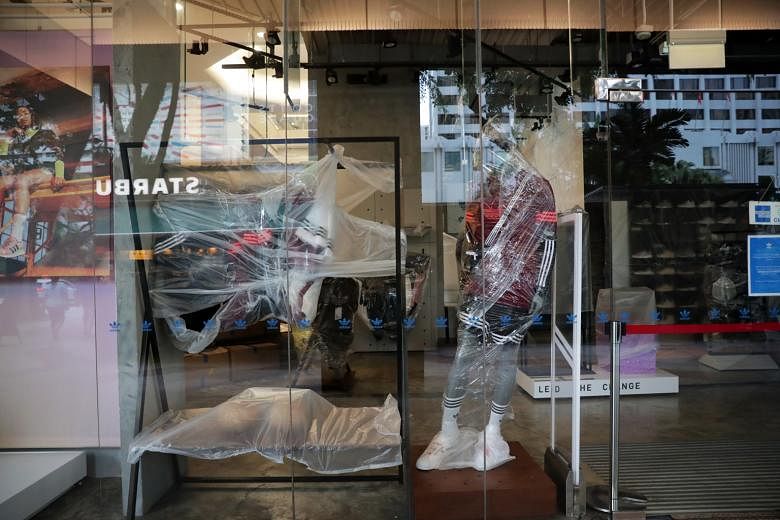The phased reopening of Singapore's economy may reduce the risk of another wave of infection, but will likely extend the recession into the third quarter and possibly delay recovery, say some economists.
Following an eight-week circuit breaker period, part of the economy will be reactivated on June 2, with measures to be lifted in three phases. In phase one, about one-third of Singapore's workforce will be able to resume work at their workplaces, while the rest will continue to work from home. This will allow 75 per cent of Singapore's economy to resume normal operations.
The economic impact, however, may be muted as many restrictions will still be in place, economists say.
"The economic environment remains extremely uncertain given that the resumption of economic activities from June 2 is dependent on the health situation then. Little clarity has been given on border reopening, suggesting that tourist activities may remain subdued for a considerable period," said UOB economist Barnabas Gan.
The extended closure of already hard-hit sectors, such as retail, F&B, hospitality and recreation, could inflict more damage as many firms may not survive another month, said Maybank Kim Eng senior economist Chua Hak Bin.
"We had expected a faster reopening of the economy. We were expecting car and property sales via physical showrooms, and more retail shops to be opened in June. But it is much easier to resume operations in factories than in malls and theme parks, where social distancing rules will continue to be stringent," Dr Chua noted.
The fourth fiscal stimulus package, to be unveiled on Tuesday, could be targeted at sectors that will remain shut in phase one, and could cost another $3 billion, he added.
Despite the circuit breaker ending on June 1, a number of businesses in manufacturing and professional services that can reopen intend to maintain split shift work arrangements and safe distancing requirements.
Snacks maker The Golden Duck has been operating under strict restrictions during the circuit breaker and is awaiting guidance on how many factory workers will be allowed to resume work on June 2.
Local sales of its salted egg yolk flavoured chips and fish skin crisps plunged by more than 50 per cent during the circuit breaker, but international sales held up. With lockdowns easing, sales to Australia, the United States and Hong Kong should continue to improve.
Fortunately, the company has a presence on Lazada and Shopee, and could ramp up online sales during the circuit breaker, said company co-founder Chris Huang. Most of The Golden Duck's 30 executives will continue to work from home after June 1 and visit the office only for essential meetings. To ensure business continuity, the split shift arrangement for factory workers will continue, he added.
However, the restrictions meant he has had to make adjustments, including delaying the launch of a product.
"How effectively can you plan a product launch and marketing campaign when face-to-face meetings aren't allowed? For new product development, we had to develop products in the factory and then send them to the homes of people involved in the product meeting. And we would do taste tests in front of the video camera, but it wasn't quite the same," he said.
Big Four law firm Rajah & Tann will continue to have most of its lawyers and staff working from home after June 1.
But it will gradually ease restrictions for those who must be in the office for completion of transactions, preparation of trials, hearings and other essential matters, said Mr Patrick Ang, Rajah & Tann's managing partner.
"Over the circuit breaker period, we have further enhanced our social distancing measures. This includes maintaining a two-team segregation system so that even if a lawyer needs to go to the office, he should only be there according to the schedule.
"In addition, we have temperature checks, health declarations, staggered hours, 1m-apart seating, maximum number of people in the office at any one time."
OCBC staff will continue to operate under split operation arrangements and staggered work hours, said Mr Francisco John Celio, head of its group corporate security.
For property firms, the extended restrictions remain a challenge.
"Buyers who have been waiting to do physical viewings of resale properties on June 2 will now hold off until July. With showflats shut for another month, agents have to continue to rely on virtual tours to sell new condos," said PropNex Realty chief executive Ismail Gafoor.
To help reduce productivity loss, the heads of more than 10 departments have been holding daily meetings via Zoom with their personnel. "That holds workers accountable and ensures their tasks are cleared every day," he added.
With companies in the Covid-19-hit sectors likely to remain in the doldrums, the Singapore Business Federation (SBF) said it hopes that the Jobs Support Scheme would be extended, with additional support given. The foreign workers' levy rebate and rental waivers should also be extended post-circuit breaker, it added.
SBF chief executive Ho Meng Kit said: "The Government could also help to alleviate some SMEs' cash flow issues by expediting payments for government contracts and bringing forward government projects."













